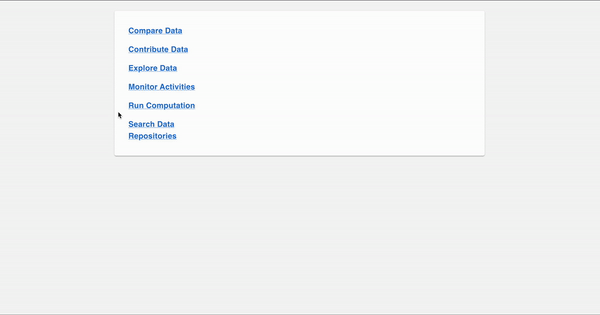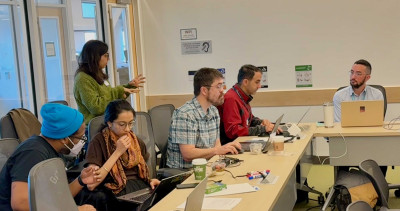The Alfred P. Sloan Foundation has awarded a $1.125 million grant to a team of researchers at the UC Berkeley Institute for Data Science (BIDS) and Lawrence Berkeley National Laboratory (LBNL). Over the next 15 months, BIDS will host a collaborative effort between BIDS, LBNL, and their partners at Superbloom, The Carpentries, and 2i2c. Through the STRUDEL project, this collective endeavor aims to promote awareness and adoption of User Experience (UX) approaches in scientific software development work. The STRUDEL (Scientific sofTware Research for User experience, Design, Engagement and Learning) project is establishing an open source, open science community to develop and sustain a planning framework and design system for creating more usable, sustainable research software workflows. “The STRUDEL Design System and associated code are exciting tools to help scientific software teams build usable web applications in a rapid manner,” said Fernando Pérez, the faculty director of BIDS. “This project will benefit directly from the many scholars interested in UX problems across many disciplinary domains.” Participants interested in learning more about STRUDEL’s upcoming courses and toolkits can visit the STRUDEL website.

Example demo of the ‘Search Data Repository’ Task Flow from STRUDEL Design System. (Credit: Berkeley Lab)
STRUDEL will provide resources and training for software development teams seeking user experience (UX) expertise. Led by LBNL Scientific Data Division (SciData) Deputy Director Lavanya Ramakrishnan, STRUDEL is informed by over a decade of collective UX experience working closely with different science domains. “STRUDEL serves as a bridge between the open source and open science ecosystems,” explained Ramakrishnan, “providing a framework that allows users to bring open source tools and robust infrastructure to open science.” The STRUDEL team has assembled multiple open source resources centered around a design system with a starter kit to help software engineers obtain the resources, guidance, and confidence they need to implement UX approaches when building UIs in their scientific software.
The Sloan Foundation grant will enable the STRUDEL team to expand its design system and develop new materials to support its dissemination to the broader community. “Community building is a cornerstone of scientific developments and discoveries,” says Sloan Foundation Program Director Josh Greenberg, “We are excited to support STRUDEL’s continued growth and new collaborations to help enable scientific software teams to improve the user experience of their essential products.” With this latest support from the Sloan Foundation, STRUDEL’s diversified team will work closely with the Berkeley Institute of Data Science (BIDS) at UC Berkeley to bring STRUDEL’s tools into a community of practice in scientific computing and related realms. By fostering community contributions and feedback, BIDS and STRUDEL will work closely with Superbloom and The Carpentries to expand the STRUDEL design system. “We will expand STRUDEL resources for the scientific community in ways that develop deeper contribution and governance structures, test out the infrastructure, and develop the curriculum,” said SciData and BIDS UX Researcher Drew Paine.
STRUDEL and its collaborators plan to expand the project’s footprint through deep community engagement with new and current users and contributors. The STRUDEL team has developed expertise in running community events. Last spring, they hosted two webinars and one hackathon to learn more about current user needs and connect with potential users. At the hackathon, attendees used STRUDEL tools to prototype a web application over just a few hours. The webinars provided attendees an opportunity to learn about the origins of the STRUDEL project and familiarize themselves with basic UX concepts. By hosting additional webinars and workshops with 2i2c, the STRUDEL team will continue to improve tools and user flows and build additional task flows, including AI and ML pipelines. The STRUDEL team will also push forward the development of a planning framework to facilitate the streamlined gathering of user needs and the prioritization of UI design in scientific projects. Together with 2i2c, the STRUDEL team will identify and develop infrastructure to support users in building prototypes and executing community workshops. “The fundamental activity of science – the exchange of information – ” said 2i2c partnerships lead Jim Colliander, “is transforming with the cloud computing era. Collaborating with STRUDEL is an excellent way to guide this transformation.”

During the spring Strudel workshops, attendees used new UX tools to prototype their own web application over just a few hours. (Credit: Berkeley Lab)
STRUDEL plans to continue to support the growth of the User Experience Working Group within the US Research Software Engineer Association (US-RSE) organization. This working group, which includes several of the STRUDEL team, including Drew Paine as a co-chair, advocates for increased awareness and adoption of user experience through adopting a community of practice. US-RSE helps facilitate webinars on UX in science, as well as networking among its participants. The working group has met monthly since December 2023 and has a dedicated US-RSE Slack channel for the community to discuss topics of interest and foster a community of practice for UX in scientific software engineering. As a valuable partner of STRUDEL, US-RSE helps practitioners create a diverse and inclusive community for larger conversations about UX research. Additionally, the working group helps to demystify UX ideas across the larger software engineering community. It introduces critical UX concepts to funding agency staff and potential collaborators across different research domains. The UX working group’s future deliverables include a white paper capturing community member’s experiences undertaking UX in different science contexts and making the case for this investment.
Superbloom will lead the organization and facilitation of additional workshops and hackathons to expand the community. These include STRUDEL’s first hackathon on the East Coast and in the South, where users will learn about user experience and prototype a user interface for their own software using STRUDEL Task Flows and resources. “We look forward to helping more users gain the crucial UX skills that they need to build more usable scientific software,” said Executive Director Georgia Bullen, “as well as train others in their communities.” The Superbloom and BIDS teams will also collaborate with The Carpentries to develop an open source UX curriculum for scientific users by leveraging The Carpentries’ infrastructure and expertise in evidence-based lesson development and accessible design. The team aims to reach potential scientific users at minority-serving institutions through collaboration with the Atlanta University Center (AUC) Data Consortium, an established partner of The Carpentries. “Accessibility is a core value of The Carpentries,” said Executive Director Kari L. Jordan, “ We are pleased to work with STRUDEL to create new, inclusive avenues of participation for users.” STRUDEL will also work closely with the UC Network of Open Source Program Offices (OSPOs) and those at other institutions to exchange best practices, collaborate to obtain funding, and to engage in outreach opportunities.
As STRUDEL continues to grow, the team will continue to look for ways to make workshops and tools even more inclusive for potential users. Ramakrishnan hopes that, after attending workshops, STRUDEL users will understand just how user experience can be easily incorporated into the software development life cycle leading to significant scientific impact. “STRUDEL is set up to democratize access to user research processes for the scientific ecosystem,” said Ramakrishnan, “while building a strong community.”
This next phase of STRUDEL will strengthen its existing partnerships and expand its reach among new user communities. By creating more opportunities for users to iterate on STRUDEL’s tools, STRUDEL and its partners will also socialize more UX principles across scientific research teams. UX tools will help researchers find solutions for the big data challenges which must be addressed in order to support expanding scientific research projects. As more teams embrace the principles of UX design, research software engineers will create better workflows and better products, broadening participation in knowledge creation across all scientific disciplines. Department of Energy science will benefit from better UI practices across the software design ecosystem, ideally spearheading increased software adoption and retention over time.
Curious to learn more? Want to connect with the STRUDEL team and contribute to conversations about user-centered design for scientific communities? Visit the STRUDEL website and sign up for email updates.
About Computing Sciences at Berkeley Lab
High performance computing plays a critical role in scientific discovery. Researchers increasingly rely on advances in computer science, mathematics, computational science, data science, and large-scale computing and networking to increase our understanding of ourselves, our planet, and our universe. Berkeley Lab’s Computing Sciences Area researches, develops, and deploys new foundations, tools, and technologies to meet these needs and to advance research across a broad range of scientific disciplines.
About Computing Sciences at Berkeley Lab
High performance computing plays a critical role in scientific discovery. Researchers increasingly rely on advances in computer science, mathematics, computational science, data science, and large-scale computing and networking to increase our understanding of ourselves, our planet, and our universe. Berkeley Lab's Computing Sciences Area researches, develops, and deploys new foundations, tools, and technologies to meet these needs and to advance research across a broad range of scientific disciplines.

